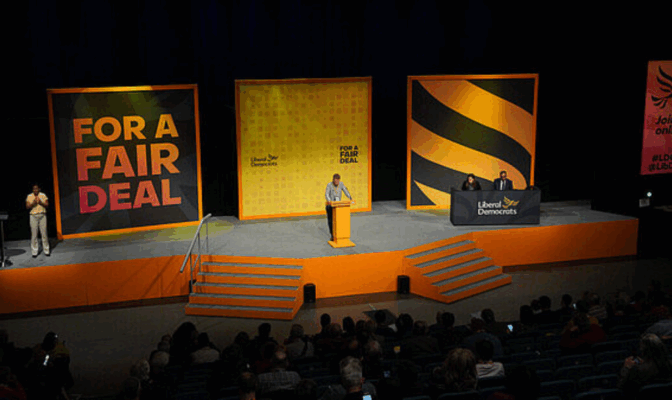The Liberal Democrat Autumn Party Conference concluded yesterday afternoon. But before attention shifts to Liverpool where Labour will kick off proceedings on Sunday, Senior Consultant, Claudia Mulholland, shares her reflections on a busy four days for the Lib Dems in Bournemouth.
As ever, if you would like to discuss opportunities to engage with the Lib Dems, please don’t hesitate to get in touch with the team.
The Liberal Democrat Autumn Party Conference is a reliably festive affair. Sun, sea and a splash of liberal debate; conference aficionados tend to agree that it is a cheerful gathering on the political calendar. This year’s conference in Bournemouth was no different. A smiling Ed Davey graced the conference hall with his typical levity and rounded things off on Tuesday morning with a game of cricket on the beach. But behind the smiles, there was a low hum of disquiet running through the conference hall, the fringe venues and into the bar.
One year on from their stellar General Election success, there is a growing sense that the Party has begun to lose its focus on policy priorities. Last year’s success was grounded in a laser focus on social care and environmental affairs. Less than 18 months later, those issues have slipped down the agenda, while the leadership seeks to expand its policy platform. Commitments on online safety and clearing the asylum backlog dominated much of the narrative and were warmly welcomed by the membership. But for many, there remains a gaping hole where economic strategy is concerned. Treasury Spokesperson, Daisy Cooper, faced tough questioning from the membership as to why the economy – consistently one of the top polling issues for the electorate – featured so little on the conference agenda. And the Party’s one major pre-Budget fiscal announcement felt awkwardly stilted. Having announced plans to roll out a windfall tax on the excess profits of banks on Sunday, the parliamentary party spent much of Monday’s business day reassuring the City that the Lib Dems remain a firm friend to business.
There were also personal challenges for Davey, whose distinctive style of politics was called into question. Polling released by More in Common on Sunday found that 47% of Lib Dem voters think that Davey’s stunts make the Party look less like a serious political contender. His parliamentary party seems similarly frustrated, and some briefed the media that Davey’s reliance on photo ops has begun to undermine the Party’s ability to gain serious media coverage for its genuine political interventions.
Davey, a firm believer in the value of light relief in public life, has said that the stunts are here to stay.
But where change does seem to be afoot is in the Party’s political strategy. Central to this is a new emphasis on Reform. It was certainly no accident that Nigel Farage’s name was referenced 31 times in Davey’s closing speech on Tuesday afternoon. The Prime Minister, for comparison, was not mentioned at all. The ultimate aim for Davey is to position the Lib Dems as the only party in Westminster willing to take on Farage and his friends in Washington D.C., and the only party prepared to resist the rise of the populist right. This staunchly moderate positioning is designed to attract support from across the political spectrum; those disaffected by Kemi Badenoch’s attempt to ‘out Reform Reform’, and those on the left increasingly frustrated by Starmer cosying up to Donald Trump.
But that approach is not without risk. By spending too much time and energy pitting itself against Farage, the Party risks gaining a reputation as reactive, defining itself by what it opposes rather than what it stands for. And for a party so uniquely tied to its distinctive set of core values, such an erosion of identity could ultimately threaten to undermine its very foundations.



